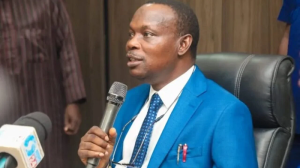The Federal Government has called on Nigerians to support its fight against illegal wildlife trafficking by providing intelligence information and discouraging animal poaching.

Minister of State for Environment, Dr Iziaq Salako, made the call at the unveiling of the statue of an elephant constructed from crushed elephant tusks and ivory stockpiled on Wednesday, July 31, 2024, in Abuja.
Salako urged Nigerians to refuse to use products that are not ethically sourced, including online sources.
He said the event was historic and a symbol of the Federal Government’s unwavering commitment to wildlife conservation.
Salako said that combating illegal wildlife trafficking would require collaboration with other agencies of government in law enforcement.
This he said include the Nigeria Custom Service (NCS), the military, Nigeria Police, National Park Service, ICPC, Nigeria Financial Intelligence Unit and other relevant agencies.
“In the spirit of collaboration, I wish to use this opportunity to commend the exemplary enforcement action of the NCS which resulted in a recent seizure of Pangolin scales and its derivatives worth over N3 billion along Kebbi axis.
“We need wildlife for our survival, well-being and prosperity as they maintain ecological balance, provide critical ecosystem systems, maintains the food chain and they keep us connected to nature.
“The Federal Ministry of Environment will continue to do everything possible to ensure that we play our part in harnessing our natural resources for sustainable development,” he said.
Earlier, Dr Innocent Barikor, Director General of National Environmental Standards and Regulations Enforcement Agency (NESREA), said the unveiled monument demonstrated the complete transparency in the action of Nigeria’s intolerant to illegal Wildlife trade.
“I want to encourage all stakeholders in the fight against Illegal Wildlife Trade to be resolute.
“Do not give up as this demonstration is just the beginning of Government representation to curb the illicit activities,” he said.
Barikor commended the support from key development partners like the Elephant Protection Initiative Foundation (EPIF), United Nations office on Drugs and Crimes (UNODC), United State Embassy, World Conservation Society (WCS), and Wild Africa, among others.
By Doris Esa
